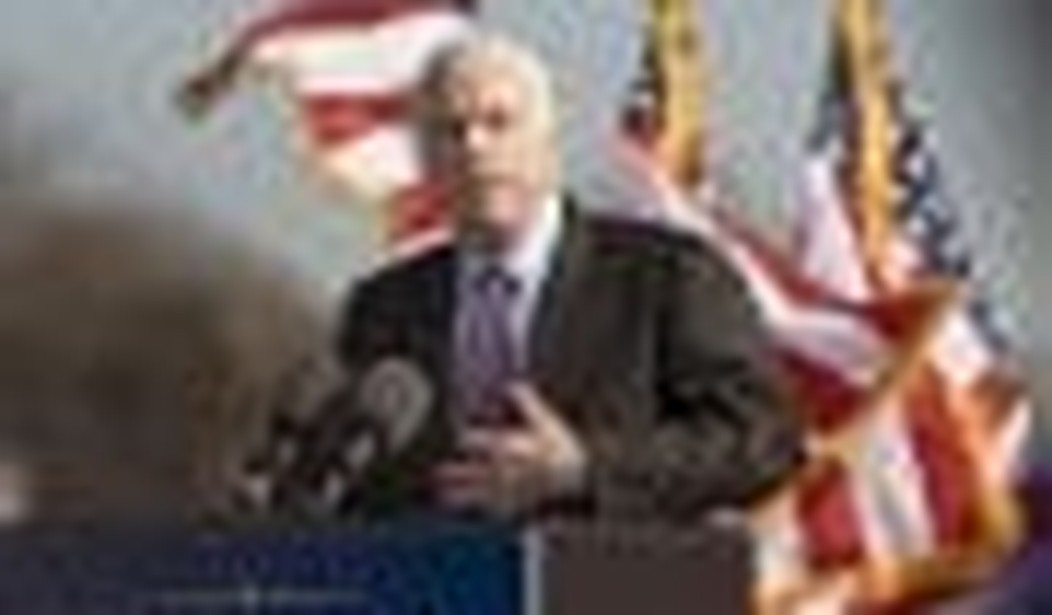Surprise — at least one poll shows a huge McCain lead: “[Senator John] McCain, R-Ariz., handily defeated Sen. Barack Obama, D-Ill., 68 percent to 23 percent in a voluntary survey of 4,293 active-duty, National Guard, and reserve subscribers and former subscribers to Army Times, Navy Times, Marine Corps Times, and Air Force Times.” Or perhaps not so surprising: there’s a history involved here.
In 1864 the nation was nearing the end of the Civil War — but some wanted it ended sooner than others. Democrats offered a platform declaring that it was “the sense of the American people, that after four years of failure to restore the Union by the experiment of war, during which . . . the Constitution itself has been disregarded in every part, . . . justice, humanity, liberty, and the public welfare demand that immediate efforts be made for a cessation of hostilities.” In short: end the war now.
Their candidate was General (still on active duty throughout the presidential campaign) George McClellan. He assured voters that restoration of the Union was a worthwhile endeavor, but hinted that other goals had since corrupted the purpose of the war he himself had once waged and nearly lost. “The Union is the one condition of peace,” McClellan wrote. “We ask no more.” He likewise pledged to restore America’s standing in the eyes of the world — in his words, “resume our commanding position among the nations of the earth.”
And along with all that, Democrats supported the troops:
Resolved, that the sympathy of the Democratic Party is heartily and earnestly extended to the soldiery of our army and sailors of our navy, who are and have been in the field and on the sea under the flag of our country, and, in the events of its attaining power, they will receive all the care, protection, and regard that the brave soldiers and sailors of the republic have so nobly earned.
Which was a good thing because America was trying something brand new that year: “absentee voting” — intended to ensure that those troops would be able to cast their ballots, too. But while Republicans claimed that voting was “a right vested in the individual which could adequately be exercised through written media, regardless of location,” Democrats countered that votes must be cast in person: “Like marriages and wills, votes required competent witnesses, defined by the Democrats as fellow citizens with shared concerns and responsibilities. Army officers appointed by the federal government could not fill this role. These conservative Democratic views of the mid-19th century seem alien to our thinking today, as absentee voting has since become a firmly established practice.”
So as Sherman marched on Atlanta a different sort of war was waged in the North:
Wisconsin was the first to permit their soldiers to vote in the field through absentee ballots. California, Connecticut, Iowa, Kansas, Kentucky, Maine, Maryland, Massachusetts, Michigan, Minnesota, Missouri, New Hampshire, New York, Ohio, and Pennsylvania all followed suit. However, Illinois, Indiana, and New Jersey, which all had Democratic-controlled state legislatures, did not pass legislation allowing soldiers to vote in the field.
But Secretary of War Edwin Stanton ensured the troops were given absentee ballots or granted leave to vote in person, and Lincoln himself asked General Sherman to allow Indiana soldiers to return home to vote. Lincoln was reelected with 55 percent of the popular vote and an Electoral College landslide, and while not decisive in the election, he received over 70 percent of the military vote.
The above shouldn’t be misconstrued as a claim that Democrats are anti-war. In fact, American involvement in World Wars I and II, then Korea and Vietnam, would begin under Democratic presidents with spines of steel. As the 20th century ended, President Clinton, after withdrawing American troops from the humanitarian mission in Somalia launched by his predecessor, actually deployed U.S. forces to several “small wars,” including two European conflicts, and launched periodic air attacks on Iraq. Still, by the year 2000 the nation thought itself “at peace.”
Odd then that combat terms were used by the New York Times in this story from November 2000:
Retreating under fire from Republicans, Florida’s attorney general, a top ally of Vice President Al Gore, said today that local officials should count absentee ballots from overseas military voters that were thrown out because they lacked postmarks. …
The most common reason cited for challenging and rejecting ballots was the absence of postmarks, or illegible postmarks, which Florida law requires on all overseas ballots. …
That seemed particularly galling to critics, since military mail can be sent without a postmark.
According to the figures provided by the Times, Bush had received about two-thirds of those absentee votes that were counted. However, even with the state attorney general’s urging, local officials still didn’t count the remainder. That prompted the Bush campaign to file suit — an action that resulted in Judge Lacey A. Collier’s decision that any federal write-in ballot thrown out only for lack of a postmark must be considered valid (something I remembered four years later as I prepared my own Florida absentee ballot in Iraq).
Which brings us back to this year:
Fairfax general registrar Rokey Suleman said Thursday that he has had to reject some of the ballots because of a Virginia law passed in 2002. That law — then called Senate Bill 113, sponsored by then-state Sen. Bill Bolling — requires that when an overseas citizen wants to request an absentee ballot and cast a vote with the same paperwork, it requires not only a witness signature but also the current address of the witness.
The McCain campaign said there’s not even a space for the witness to list an address. Suleman agreed; he said the federal document was changed in recent years and the space for the witness address was removed. But the Virginia law hasn’t changed.
Yes — military absentee ballots once again. But the law is the law, after all. And besides, Suleman is a busy man:
Suleman said his office, at the request of criminal defense attorneys who approached his staff, delivered registration forms and absentee ballots to inmates with misdemeanor convictions and those awaiting felony trials.
Suleman, who is listed as a founder of the Trumbull County (Ohio) Young Democrats, ran for office in the Buckeye State as a Democrat earlier this year. He said the office he holds in Virginia is nonpartisan.
As opposed to those partisan military folks of 2008: “Officers and enlisted troops, active-duty members and reservists, those who have served in combat and those who haven’t, all backed McCain by large margins, to about the same extent they supported President Bush four years ago.”
And four years before that, and Lincoln back in 1864.
But “resentment of those who would block their votes” doesn’t make the list of reasons they give for doing so. And while “the economy” and “character” do, I offer these quotes as additional explanation of why so many choose to vote against a seeming shortcut to peace: “I cannot vote for one thing and fight for another”, and “I do not see how any soldier can vote for such a man, nominated on a platform which acknowledges that we are whipped.”
At least, that’s how they felt in 1864.
But maybe things are different now.









Join the conversation as a VIP Member